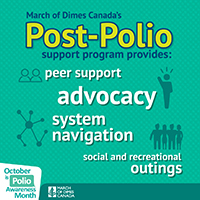Kathleen Cullen
Growing up in Newmarket, Ontario as one of nine siblings, Kathleen contracted polio when she was a toddler. Her mother suspects during the outbreak which infected Kathleen, two of her older brothers also got polio, but because their symptoms were milder, they were misdiganosed as having the flu.
"It wasn't until I got really sick that [my mother] realized that they probably had polio too. They recovered with no side effects, which 80% of the people with polio did recovered with no visible side effects."
Katheleen had to learn to live with the effects of polio at a young age, which included a lengthy stay at Sick Children's Hospital in Toronto.
"I really had polio. I mean, my whole left side was affected. From about the time I was 18 months till eight years, I didn't walk. I started grade one in a wheelchair. I had multiple surgeries. I spent a lot of time at Sick Children's Hospital in Toronto."
As she grew older, Kathleen's health history inspired her to learn more about the disease which had impacted her childhood.
"When I was taking science in high school, we have to pick [a research] topic. So I knew a lot about the history of the epidemics that [we] went through and how it affected different people. That's why I knew the 80% number, per recovery."
Kathleen moved to Brantford in 1967, and has lived with post-polio syndrome for most of her life. When asked how she has been impacted by COVID-19, she answered:
"I've really isolated myself... [It's] a little lonely sometimes, because I live alone, but I do worry about getting it on top of having post-polio syndrome... This is one of the things that worries me about the young people taking COVID-19 so lightly, because they just think they'll get over it. [I got] post-polio 30 years later, like in the 80s, long after everybody thought polio was conquered. And even my older brother who's supposedly recovered completely from what they thought at the time was the flu... he's having problems... So these people don't know [how] COVID-19 is going to affect people 20 or 30 years down the road."


